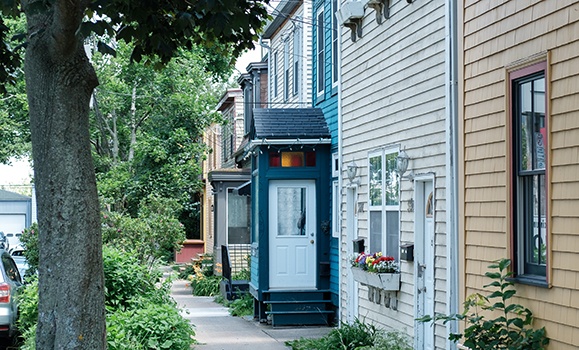Over the past two years, homeowners, buyers, seller, and renters all watched as housing costs across Canada skyrocketed. Home prices reached all-time highs with seemingly no end in sight, until the market began to cool down earlier this year with slower home-price growth and fewer sales nationally.
Now, all eyes remain on the market, with many wondering what will happen next and whether prices are headed to pre-pandemic levels. Questions also remain about what this trend means for the overall health of the market and people’s economic wellbeing.
To better understand the rapid reversal, we spoke to Jill Grant, a professor emeritus in Dal’s School of Planning and an expert on planning theory who researches housing and cities. She offered her take on the change in the market and the state of housing in Canada.
The housing market appears to be cooling down after record numbers of sales and high prices in the past two years. What’s driving this change?
One of the factors will be climbing interest rates. Those will increase the costs of borrowing, so those who might have been willing to take risks before to earn greater returns will perhaps think twice.
Another factor is the very tight housing market here in HRM. The rental market is tight, with low vacancy rates. This means that anyone trying to find accommodations is struggling. Those who may want to sell their homes find it hard to secure alternative housing (whether rental or purchase) – it’s too risky to sell then search, so many folks may think twice about listing their homes. This means the supply of houses or units for sale is low. Because there’s some fear that house prices will decline now (with the higher interest rates), some people may want to delay selling in the hope that things will climb up again. Those who are buying now may benefit from modest softening in the competition for houses.
Some are claiming this cool down is a market correction after the record prices during the pandemic. Do you believe the market truly is correcting to pre-pandemic levels? Or does this signify something more concerning in the market?
It seems unlikely that the market will return to pre-pandemic levels. Some experts have predicted the ‘bubble will burst’ since it burst in the US after the 2008 economic crisis, but that hasn’t happened in Canada. Instead, real estate has become an even more important part of the national economy. It has become a key mechanism for earning returns on investments. Pension funds and large management companies have bought up apartment buildings because with such low vacancy rates here they are excellent income producers. (Lower cost units are disappearing as owners want to upgrade units to improve their returns.)
For individuals and households, real estate has become the one thing they count on to increase in value — this encourages people to put as much as they can into their homes if they have the means to buy. (For those without the means to buy, it means declining prospects. Increasing social and economic polarisation is proving to be the result.)
As long as housing is in short supply (both rental and purchase), prices are unlikely to dip more than modestly. Government programs trying to increase the production of housing units by fast-tracking approvals and ignoring municipal planning processes aren’t likely to make a huge difference. The main limits on the production side are development companies that have little incentive to release units at a pace that would reduce their returns on their investment. If governments are going to offer incentives, they need to plan them well to avoid benefiting the developers more than residents.
Looking at the larger picture, what needs to change to make housing more affordable and avoid significant spikes like we saw during the pandemic?
Governments need to commit resources to building and maintaining social housing. Folks with limited incomes need units that are geared to their incomes. Unless we give people living wages, we can’t expect them to meet their housing needs in the market. The market is designed and operated to provide economic returns to the “haves” and is ill-equipped to provide decent and affordable housing for those of low income.
The housing crisis in Halifax has caused great controversy locally, without significant relief in sight. What steps should policymakers be taking to make housing more affordable locally?
Caps on rent increases may help (but can have the perverse effect of causing landlords to ignore problems in units). Government could provide more supports for non-profit and cooperative housing providers. Ultimately, I hope we see new programs for building social housing so that more households can be assured of decent and affordable units.

